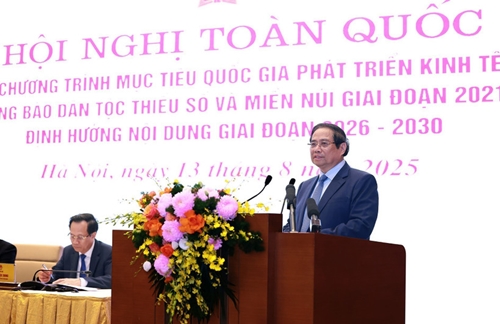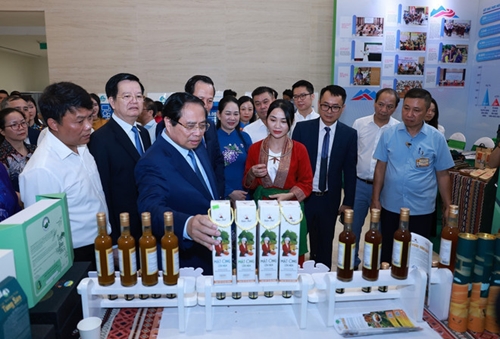He made the statement while chairing a national conference on August 13 to review the national target program on socio-economic development in mountainous and ethnic minority areas, PM Chinh for the 2021–2025 period and set directions for the next five years.
PM Pham Minh Chinh urged a candid assessment of progress, identification of shortcomings, and formulation of comprehensive and effective solutions.
    |
 |
|
Prime Minister Pham Minh Chinh addresses the conference. |
The Government leader called for a people-centered and comprehensive approach involving the full political system, with more decentralization and delegation of power, as long as stronger implementation capacity, enhanced inspections, perfected institutional frameworks, and targeted resource allocation.
In addition, it is necessary to boost human resources training, apply science and technology, and foster cooperation between the State, local people, businesses, and financial institutions to stimulate economic activities, thereby raising the life quality for people in targeted areas, he suggested.
According to the Central Steering Committee for the national target programs, Vietnam is home to 53 ethnic minority groups totaling over 14.4 million people, inhabiting areas that comprise about three-quarters of the country's land. Following the recent administrative unit restructuring, 1,516 communes across 32 provinces and cities are classified as ethnic minority and mountainous areas.
These regions, mostly in remote highland and border zones, hold strategic locations and great potential for agriculture, forestry, mineral resources, hydropower, eco-tourism, and cross-border trade. Yet, they remain economically disadvantaged due to difficult terrain, harsh climate, underdeveloped infrastructure, and vulnerability to natural disasters. Poverty remains widespread while access to essential services is limited.
To address these issues, the National Assembly approved a master plan and the national target program to boost socio-economic development in mountainous and ethnic minority areas for 2021–2030. The PM ratified the first phase (2021–2025), with a total budget exceeding 137 trillion VND (5.21 billion USD), covering ten priority projects.
To date, the program has provided residential land for 10,549 households, new homes for 42,567 families, and farmland for 13,387 households. As many as 54,899 households have received support for job transitions, while 479,358 families have gained clean water access. The program has also funded 809 concentrated water supply systems.
Resettlement support has reached 25,056 households. Local authorities have signed forest protection contracts for nearly 1.49 million hectares, benefiting 323,769 households. A total of 403 production projects based on value chains have received 306 billion VND in investment, and 383 crop and livestock farming models have supported 36,654 households.
    |
 |
|
Prime Minister Pham Minh Chinh and officials visit a booth showcasing OCOP products by producers from ethnic minority groups on the conference's sidelines. |
In transport, 6,018 projects have been implemented, paving more than 8,600 km of roads. Other infrastructure improvements include 442 power supply projects, 90 community radio relay stations, and 1,787 communal centers. Healthcare upgrades include 183 communal health stations repaired and 118 equipped. A total of 225 communal health stations and 629 schools now meet standards.
Vocational training has reached more than 115,000 workers via 1,901 models, and nearly 5,400 individuals received skills and language training for overseas work. Over 37,700 people received job counselling and support for overseas employment. More than 8,400 grassroots workers were trained in labor export.
In culture, the program restored 48 traditional villages and 69 ethnic minority tourism destinations. More than 4,400 cultural and sports facilities were constructed or upgraded, and equipment supplied. A total of 124 traditional festivals were preserved, alongside nearly 700 folklore clubs and over 5,700 cultural troupes in villages assisted.
After five years, six major target groups have met or exceeded expectations. The poverty rate declined by 3.4% annually, surpassing the 3.2% target. Per capita income reached 43.4 million VND, a 3.1-fold increase over 2020. The targets in vocational training, education, cultural preservation, and healthcare access were also achieved.
However, three target groups remain unmet, namely technical and social infrastructure in particularly disadvantaged areas; the number of communes and hamlets escaping from the "particular disadvantaged area" status; and farming and residential land for ethnic minority people.
Source: VNA